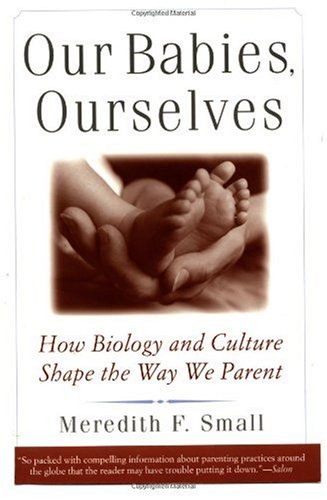Instinctual Breastfeeding
From an evolutionary point of view, it would seem that last-feeding should be one of the more instinctual behaviors, like eating or sleeping or sex. In most mammals, if mothers don't know how to offer their milk or babies don't know how to suckle, the infant dies. If die purpose of reproduction is to pass on genes, it would seem that feeding would be one of the more hard-wired biological behaviors. In explanation, Wiessinger offered this story: A female gorilla, born and raised in a zoo, gave birth to an infant. In an attempt to nurse it, the mother held her infant incorrectly, with the back of the baby's head toward the nipple. The keepers feared for the infant's life and took the baby away. During the gorilla's next pregnancy, the keepers tried an ^ experiment. They lined up a group of breast-feeding humans outside the cage and allowed the mother gorilla to observe. When her next infant was born, the mother gorilla, too, turned the baby toward her breast and everything went fine.
The point is that breast-feeding is not necessarily an automatic response for any mammal, especially under less than natural conditions. It requires certain triggers and certain coordination between mother and offspring. And humans are no different from other species. Imagine taking a newborn calf or lamb or piglet away from its mother in order to wash it and do tests. Farmers know that any separation of mother and newborn farm animals results in rejection of the infant by the mother or an inability on die part of the baby to suckle. Although we recognize this situation in livestock, we have only recently become aware that human babies have the same sort of reflexes designed to seal the pact between mother and infant right after birth. As many pediatricians and hospital staff now know, the sucking reflex is strongest within the first thirty minutes after birth. Newborns placed on their mothers' bellies directly after birth also begin wiggling and moving determinedly toward the breast when left on the mother's body for twenty minutes. "But," explains Wiessinger, "if you take the baby away and give him a bath and take his footprints and measure him and wrap him up and bring him jack, he's lost the dance." This interruption in the loop can derail the whole process. In other words, breast-feeding is instinctually and biologically triggered, but it can also be behaviorally disrupted. For example, when the birth process became medicalized in the United States in the 1930s and more babies were born in hospitals, the number of mothers breast-feeding dropped. Also, some mothers were unable to breast-feed successfully. Their failure was, in part, probably due to the long separation of baby from mother for long periods in the hospital right after birth. Today, with birthing rooms and babies kept close to their mothers at all times, breast-feeding has been proceeding more smoothly.
Notes:
Breastfeeding is instinctual, so that separating the mother from the infant can prevent it from happening, but there is a cultural aspect to it as well for primates.
Folksonomies: parenting motherhood instinct breastfeeding
Taxonomies:
/family and parenting/babies and toddlers (0.662522)
/family and parenting/motherhood/pregnancy (0.286246)
/pets/reptiles (0.277883)
Keywords:
mother (0.976752 (negative:-0.471259)), infant (0.836981 (negative:-0.439645)), mother gorilla (0.755413 (neutral:0.000000)), Instinctual Breastfeeding Breastfeeding (0.704681 (negative:-0.343755)), hard-wired biological behaviors (0.681175 (negative:-0.404843)), newborn farm animals (0.626581 (negative:-0.816694)), breast-feeding humans (0.582518 (neutral:0.000000)), baby (0.505463 (negative:-0.218431)), female gorilla (0.494578 (neutral:0.000000)), mothers (0.483575 (negative:-0.439262)), birth (0.473068 (negative:-0.263148)), cultural aspect (0.469742 (neutral:0.000000)), instinctual behaviors (0.462212 (negative:-0.201109)), evolutionary point (0.454887 (positive:0.294933)), human babies (0.451518 (neutral:0.000000)), sucking reflex (0.440523 (neutral:0.000000)), newborn calf (0.439019 (negative:-0.226375)), automatic response (0.438058 (negative:-0.323717)), natural conditions (0.437602 (negative:-0.304992)), certain triggers (0.434685 (neutral:0.000000)), certain coordination (0.427771 (neutral:0.000000)), birthing rooms (0.424103 (neutral:0.000000)), hospital staff (0.418684 (negative:-0.237957)), United States (0.415887 (neutral:0.000000)), long periods (0.412177 (negative:-0.263148)), long separation (0.410954 (negative:-0.263148)), birth process (0.407189 (neutral:0.000000)), keepers (0.296096 (negative:-0.237238)), Wiessinger (0.288219 (neutral:0.000000)), nipple (0.255578 (neutral:0.000000))
Entities:
Wiessinger:Person (0.741059 (neutral:0.000000)), jack:Person (0.554193 (negative:-0.454450)), United States:Country (0.552029 (neutral:0.000000)), thirty minutes:Quantity (0.552029 (neutral:0.000000)), twenty minutes:Quantity (0.552029 (neutral:0.000000))
Concepts:
Infant (0.987942): dbpedia | freebase | opencyc
Childbirth (0.765961): dbpedia | freebase
Breastfeeding (0.729522): dbpedia | freebase | yago
Pregnancy (0.639595): dbpedia | freebase | opencyc
Milk (0.562471): dbpedia | freebase | opencyc
Maternal bond (0.555220): dbpedia | freebase
Baby bottle (0.528329): dbpedia | freebase | opencyc | yago
Pacifier (0.525539): dbpedia | freebase | opencyc






